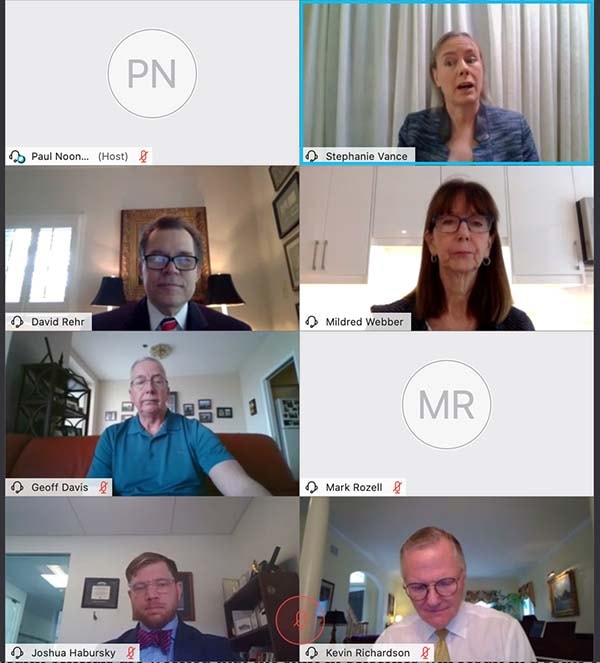In This Story
Originally published on May 27, 2020
A screenshot from the webinar. Clockwise from top right, Stephanie Vance, Mildred Webber, Kevin Richardson, Joshua Habursky, Geoff Davis, David Rehr.
More than 200 viewers tuned in to an afternoon Schar School webinar addressing an industry many might not realize is damaged, perhaps permanently, by the novel coronavirus pandemic: Lobbying.
The May 19, hour-long virtual panel discussion called Lobbying Congress in a Post Covid-19 World asked questions and provided answers on the effect of the pandemic and the ensuing global lockdown on the professional advocacy industry’s strategies and tools.
Panelists included veteran Capitol Hill staffer Mildred Webber, who shared her perspective on what some members of Congress and their staffs are viewing as effective influence in the post-COVID-19 world; author Stephanie D. Vance, whose experience as a legislative director and chief of staff in Congress led her to founding Advocacy Associates; former U.S. Rep. and House Majority Whip Geoff Davis (R-Ky.), managing partner of Republic Consulting; Joshua Habursky, head of federal affairs for the Premium Cigar Association and founder and chairman of the Grassroots Professional Network; and Kevin Richardson, president and managing director of the multinational Heartland Solutions Group and former senior vice president for government affairs for the ServiceMaster Company and former mayor of Lake Barrington, Ill.
Schar School professor David K. Rehr, director of the school’s Center for Business Civic Engagement, moderated. Schar School Dean Mark J. Rozell hosted.
Topics ranged from how to prepare for meetings—“Come in ready with details, pricing, and how long a vaccine will take to deploy,” Richardson offered as an example for the need for urgency—to how to organize phone calls (minimize the number of Zoom callers, for instance), the use of third-party validation as an introduction to Hill staffers, the use of digital media, and creating research that is sure to be read.
With video conference calls being the norm during the lockdown, many are finding them easier to arrange and participate in, Vance said. Habursky, who normally counts on in-person events to promote cigar industry issues, agreed that accessibility with members and their staffs is easier and routine now, adding that a “hybrid” method of in-person and virtual access is likely to be normal going forward.
One aspect of lobbying that will not change, said Webber, are special event days on the Hill such as those when constituents bring their pets as attention-getters. “The member loves it and the staff loves it,” she said. “I think not having them is temporary.”
Rehr said the results of a recent survey surprised him when it revealed “an openness by staff to watch videos, up to five minutes long if the content is good.” He encouraged the use of polished, brief video productions in a post-pandemic lobbying environment.
“The webinar was well received,” Rehr said after. “Our choice of panelists was outstanding. We provided value to students, policymakers, and those in all facets of the advocacy business.”

